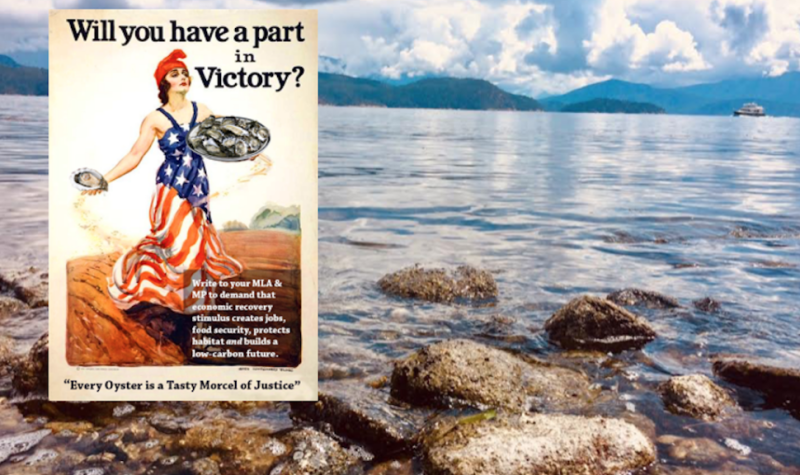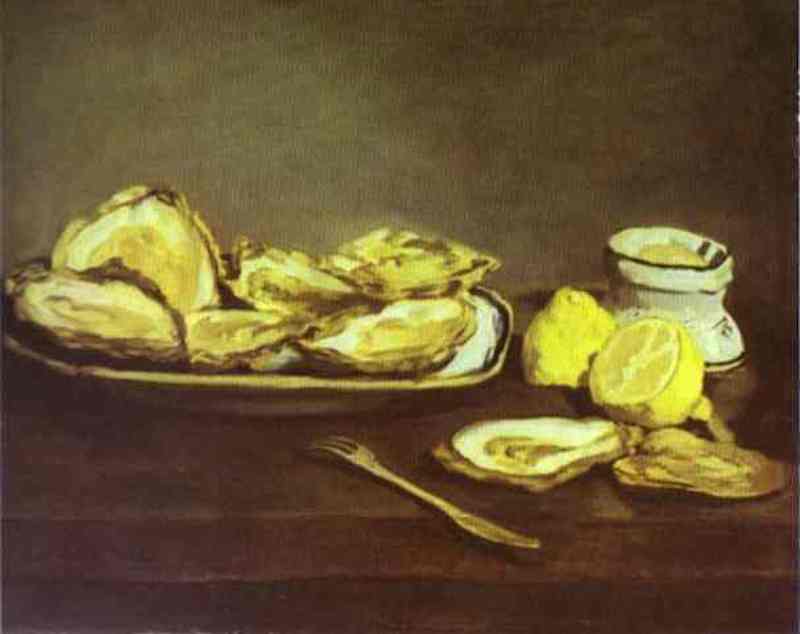By Max Thaysen
The Cortes community is in various levels of emergency mode: the climate emergency has moved many people to increase their local self-reliance. Community non-profits like the Cortes Community Economic Development Association , the Friends of Cortes Island Society and Climate Hope are organizing to relocalize essential needs like food production .
And then the covid-19 pandemic came along with its own challenges to the established modern food systems - bacon is under threat .
Enter The Cortes Island Shellfish Farmer
The folks of Cortes Island are hearing the call. Many people who previously had gardens are expanding them. People who haven't had gardens before are starting one up.
But what about the other food groups? What about the critical brain-building inflammation fighting fats, and muscle building protein?
Perhaps we will be saved by the humble Cortes Island shellfish farmer.
Enter: Erik Lyon, owner / operator of Rising Tide Shellfish .
He says that Cortes Island is well suited to produce large volumes of high quality food with very little inputs.
Oysters Are Good Food
Oysters are a good food. They're full of healthy fats, protein, vitamins and minerals. So the case is easy to make that we should eat them. But there are also some ecological benefits to growing oysters.
This can be difficult to understand and accept - we've become accustomed to agriculture being a necessary evil in the quest to satisfy the hunger of 7 billion people. It is associated with deforestation and the loss of habitat. water consumption and pollution, greenhouse gas emissions and so on… Could it be that oyster farming really is not just benign, but in other ways beneficial?
Dr. Tim Green from VIU joins us to elaborate on the beneficial impacts of shellfish farms.
He points out that having people making a nutritional and economic income from the ocean are going to be “the first ones to notice when things are going wrong and the first ones to be jumping up and down about it”.
Things Are Going Wrong
It's complicated though. Oyster farmers do sound the alarm and need clean water; they also ship much of their product around the world with refrigeration and airplanes.
Oyster farmers are seeing things going wrong.
Erik and Dr Green describe the impacts of climate change that they've already seen.
Global average atmospheric temperatures have risen nearly 1 degree Celsius already and average ocean temperatures have risen about half that, .5 degrees Celsius. For a non-scientist, it can be hard to imagine how a seemingly small shift in the average can have such a big impact.
Dr Green says, it's not so much the steady but small climb in temperature, about .02 oC per year, but rather it's the frequency and intensity of marine heatwaves.
Dr Green Is Working On It
So, shellfish aquaculture has all this potential, and it's also facing some serious threats. But Dr Green is working on it.
His lab at VIU is studying how oysters are being impacted and has a selective breeding program to try to help them overcome climate challenges.
So there's hope that oysters can adapt to climate change, but there are other challenges to the industry.
How The Market Shut Down Overnight
Erik describes how the market for oysters shut down 'over night'.
Shellfish aquaculture can help with other societal impacts from Covid-19.
“The government of Canada is aware that some meat processing plants are reducing slaughter capacity or temporarily closing due to impacts of COVID-19, which is causing a backup of live animals on farms across the country”, said agriculture minister Marie-Claude Bibeau.
Mary Robinson is president of the Canadian Federation of Agriculture. The CBC reports her as saying “Agriculture, the foundation of our overall food supply is, at this very moment in time, at a tipping point… If we do not, as a nation, address the rising challenges immediately, Canadian consumers could see a decrease in the amount and variety of food at their local grocery stores as well as higher prices, in the months ahead… We face the possibility that crops will rot in the fields, as is now happening in other countries ”, pointing to labor shortages and market uncertainty due to the pandemic.
The pandemic has affected the land-meat industry extensively. The virus spreads easily in slaughterhouses and many of them have been shut down. This has created a backlog of animals at slaughter size - - and they keep eating and costing money while they wait.
Shellfish Don't Have Those Problems
Fruit and vegetable producers are having a hard time finding the workers to pick the fruit, resulting in food that rots in the field.
Shellfish doesn't have these problems. They can sit on the beach and keep getting bigger and bigger.
Oysters have a history of helping the down-and-out. According to The Big Oyster written by Mark Kurlanski - oysters may have played an important role in establishing New York City. Kurlanski describes how one could happen on the shores, broke and jobless, and yet eat everyday from the plentiful oysters on the beach until one got a job.
With the international and restaurant markets for shellfish having been canceled due to pandemic, and shellfish growers on the forefront of agricultural technologies that reduce our ecological footprints - it would be sensible for a large chunk of economic recovery stimulus to support the shellfish aquaculure industry.
And we can call for that from our governments. But there's something else we can do: buy and eat more shellfish.
Food Preferences Change Over Time
Food preferences change dramatically over time, and it's not until we look back on their history that we see this clearly.
Avocados haven't always been so popular. They've benefited from a clever marketing campaign. Off to a rough start with the nickname 'Aligator Pears', they received much attention when a bunch of National Football League stars were compelled to have a guacamole cook-off. And then some person named Kim Kardashian put avocado on her hair and another named Miley Cyrus tattooed an avocado on her arm.
Bacon was not always a popular breakfast food. Around 100 years ago, the Beech Nut Company, in America, sought to increase bacon consumption. They found a marketing professional who was willing to find creative ways to alter the preferences of shoppers: Mr. Edward Bernays.
Bernays had a Doctor on his team who found that a switch from a light breakfast of grains and fruit to a heavier one of bacon and eggs would be in the best interest of American's health. The Doctor gathered found 5000 of his peers to agree and the rest is history.
Eat More Shellfish
Erik eats oysters for breakfast. Though working with them all the time does mean he has his limit.
But oysters aren't necessarily on the menu at home for many people in BC. Erik sells large beach oysters overseas and cocktail oysters to the restaurant industry. Both markets been shut down due to the pandemic.
So, just when the industrial meat packing industry is considering packing it in - shellfish is there for us.
Farmers, who typically have very low profit-margins, are having to hold back full sized animals because they can't get them processed. And farmers can't start the next round of production until the old ones are out of the way. The animals still need to eat, so farmers are losing money on both ends.
Oysters don't have that problem. They can put the oysters on the beach to, largely, fend for themselves.
As citizens, we can do our part by investing in, and eating local, sustainably produced shellfish. Canadians aren't in the habit of eating shellfish at home, but this can change. Bacon wasn't a breakfast food until a marketing agency got doctors to promote it. Avocados, or Alligator Pears as they used to be called, weren't popular until football stars and pop stars made it so.
Maybe you think shucking oysters is dangerous. Well, a plastic surgeon in London was repairing the hands of so many people who cut themselves while slicing avocados that his staff called the injury “ avocado hand ”.
Oysters the animal sequesters carbon. This benefit is usually lost in long transport distances, but a local market would help with that.
Dr Green is hopeful that his work in oyster breeding could be used to help other creatures survive the changing climate.
Oysters are high in zinc, and zinc shortens the duration of the common cold, and, according to one Dr. Robb, the possibility that zinc may be of some benefit in coronavirus infection cannot be ruled out.
And if that's not enough, they have other benefits.
Erik says that there is honor, fun and adventure in shellfish. And there is ample opportunity for connection to the web of life.
Many thanks to Erik Lyon and Dr Tim Green for working to increase food security on the coast and for telling us about it.
Thanks to a special digital artist for making the Oyster Victory poster.



